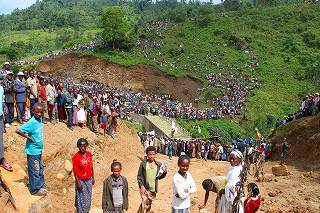| |
 |
An inauguration ceremony for the Project for the Construction of the Sala River Bridge, South Omo Zone, SNNPRS, was held on Friday 18 November 2011. This project was funded by the Japanese Grant-in-aid Scheme for Grassroots Human Security Projects (GGP), amounting to a total of USD 106,323. H.E. Mr. Hiroyuki KISHINO, Ambassador of Japan to Ethiopia, Mr. Yoshinori KITAMURA, First Secretary of the Embassy of Japan, and Ms. Hikari NISHIMOTO, Third Secretary of the Embassy of Japan, celebrated the completion of the bridge, together with representatives of the South Omo Zone and the Debub Ari Woreda, and members of the community.
At the inauguration ceremony, H.E. Hiroyuki KISHINO expressed his congratulations when handing over the bridge project, which was completed on time with support from the community. The Ambassador also expressed his hope that the community would make the most use of its newly built bridge and enjoy great benefits. He added that it is important that the bridge should be maintained in good condition to serve the local interests for a long time. In addition, His Excellency said he hoped that the Sala Bridge would become a symbol of friendship and good will between the people of Ari and the people of Japan for many years to come. His Excellency also hoped that the Embassy and the project partners could work together again for the economic and social benefit of other remote local communities in the Zone.
Since 1997, the South Omo Zone has been a partner for the Grassroots Human Security Projects (GGP). To date, ten GGP projects have been implemented in the Zone with a total funding of USD 815,000. Three of them are now located in the Debub Ari Woreda, the previous two being the Metser Primary School expansion project and a food security project that constructed a Famers’ Training Center and a seedling nursery in Metser village and rehabilitated 15km of road from Shirshir village to Wubhamer village.
The GGP scheme was first introduced in 1989, and thus it has a history of 21 years to date. In Ethiopia, since 1997, around 300 projects have been implemented under this scheme in such sectors as education, water supply, health services, and other basic human needs. For the 2011 JFY (April 2011 – March 2012), the Embassy of Japan is planning to award grants to 18 projects submitted by various not-for-profit organizations and local authorities throughout Ethiopia for the economic and social benefit of underprivileged people in rural areas. One of the characteristics of GGPs is that they are directly beneficial to local residents.
DETAILS OF THE PROJECT
The Project for the Construction of the Sala River Bridge, South Omo Zone, SNNPRS (USD106,323 signed on 8 December 2010)
The Debub Ari Woreda is located in one of the most remote areas of Ethiopia, and a shortage of food occurs from time to time. In the rainy season especially, people in Wubhamer village do not have easy access to the social and economic services across the river, such as the market and hospital, due to the frequent flooding that occurs. Similarly, each time the Sala River floods, people living in the surrounding villages cannot reach the market in Wubhamer village, where there is a famous enset market.
In these circumstances, this project aimed at improving access throughout the year to social and economic services for the residents in this area by constructing a bridge over the Sala River, 11m in length and 3.7m in width, with 10m bridge wings. As a result, 26,000 people living in this area will be able to cross the river safely throughout the year. This will bring significant economic and social benefits to the entire area since isolated villagers can now reach the principal markets and have better access to various public welfare services.
|
|



